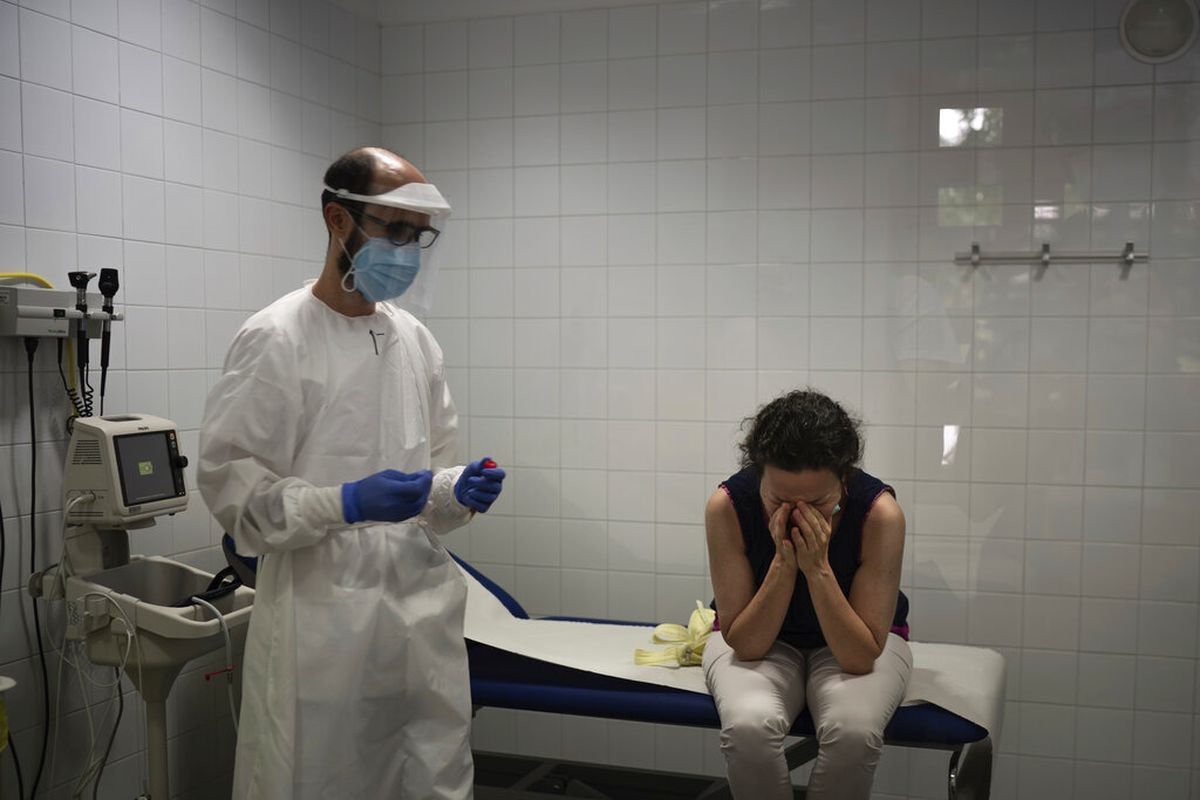Spain’s Latest Coronavirus Outbreaks Affect the Young and Middle-Aged

ANT SADURNÍ D'ANOIA, KOMPAS.com - After lifting a three-month lockdown to mitigate the coronavirus pandemic, Spain’s government is now possibly facing a second wave of infections.
The European Union nation experienced 28,400 Covid-19-related deaths since the start of the Covid-19 outbreak.
When Spain’s government made the call to reopen the economy, Spaniards were encouraged to cautiously resume their lives under “new normality.”
Spaniards were told to wear face masks, wash their hands, and physical distance.
For a moment, the Covid-19 virus seemed to be under control including for Spaniard Emma Gaya who thought the worst of the coronavirus pandemic was behind her.
Outbreaks among farmworkers and young people desperate to resume socializing after being cooped up have spread across northern Spain, spawning what some health officials fear could be the start of a dreaded “second wave" of infections.
“It pains me to think that we could be right back where we were,” Gaya said after getting tested for coronavirus at her local health clinic in Sant Sadurni D’Anoia, a village near Barcelona.
She came in because she had a fever, one of the typical symptoms of Covid-19, along with a dry cough and the loss of a sense of smell.
“I think we had done things well. Now I don’t know if we are doing it well at all. I’m not sure at what point we are safe," Gaya said.
On June 22, the day after Spain ended a national state of emergency and restored free movement around the country, the health ministry registered 125 new cases in 24 hours.
Six weeks later, the daily count has jumped, hitting 1,525 on Friday.
Spain is leading Western Europe’s major countries with an average of 60 coronavirus cases per 100,000 inhabitants.
While the country's south and the Canary and Balearic Islands remain in good shape, the regions of Navarra, Aragón, and Catalonia have registered more than 120 cases per 100,000 inhabitants over a 14-day period.
This makes Spain's northeast the biggest European hot spot along with parts of Romania, according to the European Center for Disease Prevention and Control.
In contrast to the darkest weeks of March and April, when the virus ripped through Spain's elderly in nursing homes and pushed the country's hospitals to the breaking point, the pressure is now on Spain’s neighborhood health clinics.
They are trying to screen and isolate the new infections, which are taking place mostly among the young, who in Spain and countries across the world are ignoring social distancing and the middle-aged.
The average age of a virus patient in Spain has fallen from 63 in the spring to 45 now and “the pressure on the health system is low,” said Spanish Health Minister Salvador Illa.
Since the virus takes a heavier toll on the elderly, younger coronavirus patients means more who have milder symptoms.
Spain's improved testing capacity makes a comparison to the start of the pandemic difficult.
In February, March and April, a shortage of tests meant that only the very sick who were admitted to hospitals were tested and that a significant number of coronavirus cases went undetected.
Now, local clinics are discovering many more infections among those who don’t show symptoms.
“We are in a different situation (than the spring) because right now we have tests available,” said Dr. Miriam Ceña, director of the health clinics in Sant Sadurni D’Anoia, which is seeing a jump in cases like the area around Barcelona, Catalonia’s largest city.
“We are in a situation of risk and alert. We don’t want to alarm the population, but we want the population to be responsible,” Ceña said.
In March, there was the lockdown so the situation was under more control. Right now, there is free movement and socializing and those are a risk of contagion.”
The surge in new infections is sure to add to the drastic contraction of Spain's economy by slamming hopes of reactivating the country's critical tourism sector.
The economy has already dropped 18 percent in the second quarter — its biggest dip since Spain's 1936-39 Civil War.
Britain has placed a 14-day quarantine on travelers returning from Spain, while France, Germany, and Belgium have all issued travel warnings or discouraged trips to northeast Spain.
Authorities have for several weeks warned about the danger of new outbreaks, but experts predicted they would likely occur in the colder months.
Instead, the surge has come in mid-summer, when Spaniards are eager to reconnect with family and friends, and hotels, restaurants, and shops are counting on both domestic and foreign tourists to cushion the pandemic's blow to their balance sheets.
Spain must now pull off the delicate balancing act of managing the health crisis while reactivating its economy.
Officials desperately hope they can avoid another full lockdown that would be catastrophic to businesses and jobs despite the expected injection of massive aid from the European Union.
Catalonia and many other regions have reintroduced restrictions, making masks obligatory at all times outside the home and reclosing nightclubs due to their links to outbreaks.
“We must be obsessive about complying with the protection measures,” said Catalonia's public health director, Josep Argimon.
Catalonia, however, is only now deploying 600 workers to its clinics to help nurses and doctors handle the demands of contact tracing, which has been insufficient so far. That lack of urgency has drawn strong criticism from health workers and mayors.
Spain’s government is rolling out a phone app to help contact tracers find and stamp out new infections, while making a renewed appeal for individuals to act responsibly.
“There are many citizens who feel anguish upon seeing the outbreaks that are happening in different parts of our country,” Spanish Prime Minister Pedro Sánchez said Friday.
“Because we have all had to make an enormous effort to be disciplined, show resistance, and muster the will to defeat the virus.”
(Writers: Renata Brito, Joseph Wilson)
Source: https://apnews.com/703d9d02ede92e29487a9a7c4c8ab47d
Simak breaking news dan berita pilihan kami langsung di ponselmu. Pilih saluran andalanmu akses berita Kompas.com WhatsApp Channel : https://www.whatsapp.com/channel/0029VaFPbedBPzjZrk13HO3D. Pastikan kamu sudah install aplikasi WhatsApp ya.

































